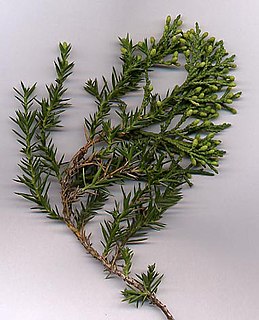
Juniperus chinensis, the Chinese juniper is a species of plant in the cypress family Cupressaceae, native to China, Taiwan, Myanmar, Japan, Korea and the Russian Far East. Growing 1–20 m (3.3–65.6 ft) tall, it is a very variable coniferous evergreen tree or shrub,
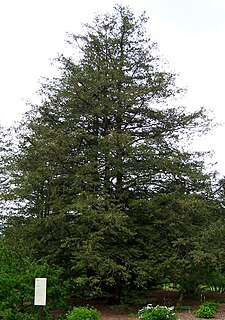
Chamaecyparis pisifera is a species of false cypress, native to central and southern Japan, on the islands of Honshū and Kyūshū.

Celosia argentea, commonly known as the plumed cockscomb or silver cock's comb, is a herbaceous plant of tropical origin, and is known for its very bright colors. In India and China it is known as a troublesome weed.
Banksia plumosa is a species of shrub that is endemic to Western Australia. It has hairy stems, broadly linear pinnatifid to pinnatipartite leaves with triangular lobes, creamy-yellow flowers in heads of up to eighty, and egg-shaped follicles.

Verticordia plumosa, commonly known as plumed featherflower, is a flowering plant in the myrtle family, Myrtaceae and is endemic to the south-west of Western Australia. It was the first species in the genus to be described, although initially given the name Chamelaucium plumosum. It is a shrub with linear leaves and rounded groups of scented pink, mauve or white flowers. Two varieties of this species have been declared as being "threatened".
Banksia plumosa subsp. plumosa is a subspecies of Banksia plumosa. As an autonym, it is defined as encompassing the type material of the species. It was known as Dryandra plumosa subsp. plumosa until 2007, when Austin Mast and Kevin Thiele sunk all Dryandra into Banksia. As with other members of Banksia ser. Dryandra, it is endemic to the South West Botanical Province of Western Australia.

Dryandra subg. Dryandra is an obsolete clade of plant. It was a series within the former genus Dryandra. The name was first published at sectional rank as Dryandra verae in 1830, before being renamed Eudryandra in 1847, the replaced by the autonym at subgenus rank in 1996. It was ultimately discarded in 2007 when Austin Mast and Kevin Thiele sunk Dryandra into Banksia.
Dryandra ser. Plumosae is an obsolete series within the former genus Dryandra. It was published by Alex George in 1996, but discarded in 2007 when Austin Mast and Kevin Thiele sank Dryandra into Banksia.
Acropora plumosa is a species of acroporid coral that was first described by Dr. C. C. Wallace and J. Wolstenholme in 1998. Found in marine, tropical, reefs on slopes sheltered from wave action, and on reef walls. It occurs at depths between 10 and 30 m. It is classed as a vulnerable species on the IUCN Red List, and it has a decreasing population. It is not common and found over a large area and is classified under CITES Appendix II.

Bryopsis plumosa, sometimes known by the common names green algae or hen pen, is a type of green seaweed.
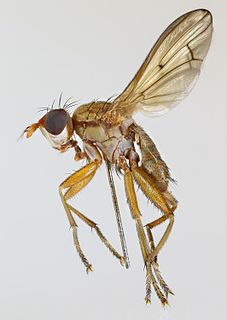
Tetanocera elata is a species of fly in the family Sciomyzidae. It is found in the Palearctic Larvae of T. elata are known obligate feeders on slugs both as parasitoids and predators.

Petrophile plumosa is a species of flowering plant in the family Proteaceae and is endemic to southwestern Western Australia. It is a shrub with rigid, sharply-pointed, sometimes lobed leaves, and more or less spherical heads of hairy, pale yellow flowers.
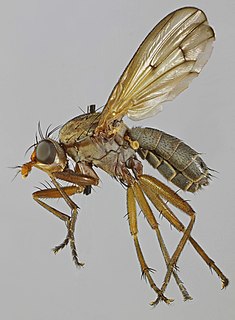
Tetanocera is a genus of marsh flies, insects in the family Sciomyzidae. There are at least 50 described species in Tetanocera.
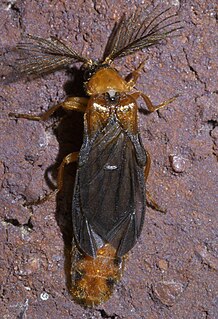
Phengodes is a genus of glowworms in the beetle family Phengodidae. There are more than 30 described species in Phengodes.

Phengodes plumosa, known generally as the glow worm or railroad-worm, is a species of glowworm beetle in the family Phengodidae. It is found in North America.
Collinsia plumosa is a species of dwarf spider in the family Linyphiidae. It is found in the United States and Canada.
Tetanocera melanostigma is a species of marsh fly in the family Sciomyzidae.
Tetanocera clara is a species of marsh fly in the family Sciomyzidae.
Tetanocera valida is a species of marsh fly in the family Sciomyzidae.
Tetanocera plebeja is a species of marsh fly in the family Sciomyzidae.











